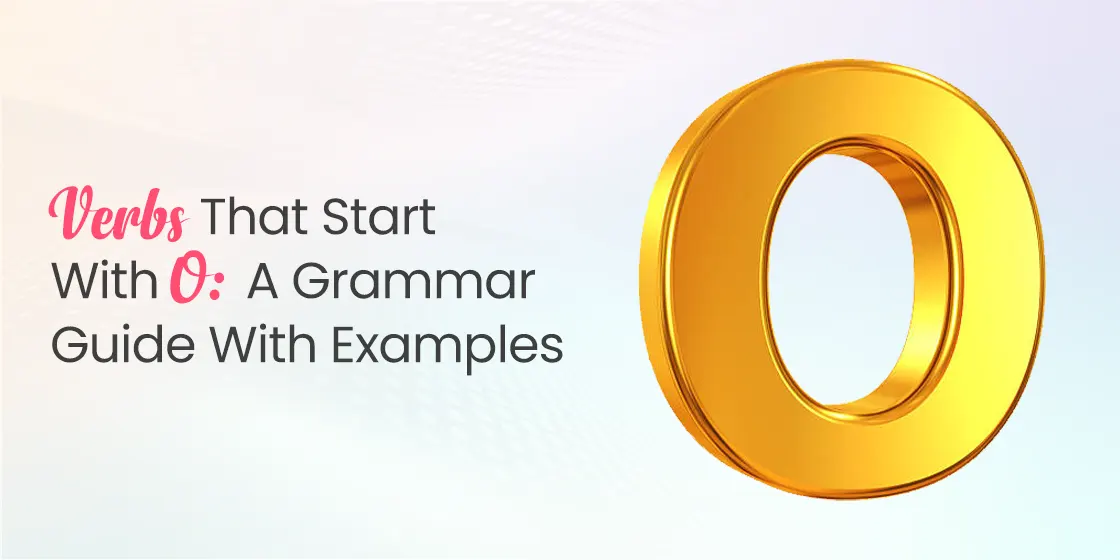Table of Content
Discover How the Best Verbs That Start With O Add an Obvious Charm to Our Content
The English language contains a treasure trove of verbs that start with O, each carrying its own unique meaning and purpose in communication. From everyday actions like “open” and “offer” to more complex concepts like “optimize” and “orchestrate,” these O-verbs form an essential part of our vocabulary that enables precise and expressive communication.
Understanding verbs that start with O can significantly enhance your writing, speaking, and overall language proficiency. Whether you’re a student looking to expand your vocabulary, a writer seeking more dynamic word choices, or someone learning English as a second language, mastering these verbs will add depth and variety to your expressions.
This comprehensive guide explores the fascinating world of O-verbs, categorizing them by type and providing practical examples to help you use them effectively in your daily communication. Let’s dive into this linguistic adventure from a web copywriting services perspective and discover how these powerful action words can transform your language skills.
Understanding the Basics of Verbs That Start With O
Verbs that start with O encompass a wide range of actions, states, and occurrences that we encounter in daily life. These words express everything from physical movements and mental processes to emotional states and abstract concepts. The beauty of O-verbs lies in their diversity and the precision they bring to our language.
Most verbs that start with O follow standard English grammar rules, though some are irregular and require special attention to their conjugation patterns. Understanding these basic principles helps you use O-verbs correctly in different tenses and grammatical contexts, making your communication more effective and natural.
The frequency of O-verbs in English is notable, with the letter O appearing in approximately 7.5% of English words. This makes O-verbs relatively common in everyday speech and writing, emphasizing the importance of mastering their usage for fluent communication.
Common Action Verbs That Start With O

Action verbs beginning with O describe physical, mental, and emotional activities that bring energy and movement to our language. These dynamic and vivid verbs help create vivid imagery and engage readers or listeners by illustrating specific actions and behaviors.
Essential Action Verbs:
- Observe – to watch carefully or notice details
- Operate – to work, function, or control machinery
- Organize – to arrange systematically or put in order
- Open – to make accessible or allow entry
- Offer – to present something for acceptance
- Overcome – to succeed in dealing with challenges
- Obtain – to get, acquire, or receive something
- Occupy – to fill or take up space or time
- Occur – to happen or take place
- Opt – to make a choice or decision
These action verbs form the backbone of dynamic communication, allowing speakers and writers to convey specific activities with precision. Each verb carries its own connotation and usage context, making them valuable tools for expressing different types of actions and their nuances.
Positive and Motivational O-Verbs
Positive verbs that start with O inspire optimism and encourage constructive action. These uplifting positive words help create encouraging communications and motivate others through their inherent positivity and forward-thinking nature.
Inspiring O-Verbs:
- Optimize – to make something as effective as possible
- Orchestrate – to arrange or organize harmoniously
- Outperform – to exceed expectations or standards
- Outshine – to surpass in brightness or excellence
- Overcome – to triumph over difficulties
- Overachieve – to perform beyond expected levels
- Overwhelm – to affect powerfully (in positive contexts)
- Outline – to describe the main features clearly
- Originate – to create or initiate something new
- Oxygenate – to supply with oxygen or fresh energy
These positive verbs that start with O serve as powerful motivational tools in both personal and professional contexts. They encourage growth, achievement, and positive change while maintaining an optimistic outlook on challenges and opportunities.
Regular vs. Irregular O-Verbs
Understanding the difference between regular and irregular verbs that start with O is crucial for proper grammar usage. Regular O-verbs follow the standard pattern of adding “-ed” for past tense and past participle forms, while irregular verbs have unique conjugation patterns that must be memorized.
Regular O-Verbs Examples:
- Offer – offered, offered
- Open – opened, opened
- Operate – operated, operated
- Organize – organized, organized
- Optimize – optimized, optimized
- Occupy – occupied, occupied
- Observe – observed, observed
- Obtain – obtained, obtained
- Occur – occurred, occurred
- Outline – outlined, outlined
Irregular O-Verbs Examples:
- Overcome – overcame, overcome
- Overtake – overtook, overtaken
- Outdo – outdid, outdone
- Outgrow – outgrew, outgrown
- Outrun – outran, outrun
Mastering these conjugation patterns ensures grammatically correct usage in all tenses and helps avoid common mistakes that can confuse meaning or sound unnatural to native speakers.
Business and Professional Verbs That Start With O

In professional and business contexts, verbs that start with O play a crucial role in describing workplace activities, management functions, and organizational processes. These specialized verbs help communicate complex business concepts with clarity and precision.
Professional O-Verbs:
- Orchestrate – to coordinate complex activities
- Optimize – to improve efficiency or effectiveness
- Outsource – to contract work to external providers
- Overhaul – to completely renovate or restructure
- Oversight – to supervise or monitor activities
- Operationalize – to make something functional
- Objectify – to make something concrete or tangible
- Obligate – to bind by contract or duty
- Officiate – to perform official duties
- Orchestrate – to arrange or direct skillfully
These professional verbs enable precise communication in workplace settings, helping to describe complex processes, management strategies, and organizational functions with appropriate terminology that conveys expertise and professionalism.
Academic and Educational O-Verbs
Educational contexts require specific verbs that start with O to describe learning processes, academic activities, and intellectual pursuits. These verbs help educators and students communicate effectively about various aspects of education and knowledge acquisition.
Academic O-Verbs:
- Outline – to present main points systematically
- Observe – to watch and analyze carefully
- Objectify – to make abstract concepts concrete
- Organize – to structure information logically
- Originate – to create new ideas or theories
- Oppose – to present counterarguments
- Overlook – to review or supervise
- Oversee – to monitor academic progress
- Overhear – to accidentally hear information
- Overstate – to exaggerate for emphasis
These academic verbs facilitate clear communication about educational processes, research methodologies, and scholarly activities, enabling students and educators to discuss complex concepts with appropriate precision and clarity.
Emotional and Psychological Verbs That Start With O
Verbs that start with O also encompass emotional and psychological states, helping us express feelings, mental processes, and internal experiences. These verbs add depth to emotional communication and help describe complex psychological phenomena.
Emotional O-Verbs:
- Obsess – to preoccupy thoughts excessively
- Offend – to cause hurt or displeasure
- Overwhelm – to overpower emotionally
- Oppress – to burden or weigh down
- Ostracize – to exclude from social groups
- Outrage – to provoke intense anger
- Overreact – to respond excessively to stimuli
- Overcome – to triumph over emotional challenges
- Overindulge – to gratify desires excessively
- Overthink – to analyze situations excessively
These emotional verbs provide nuanced ways to express psychological states and emotional experiences, enabling more precise communication about mental health, relationships, and personal growth.
Scientific and Technical O-Verbs

In scientific and technical fields, verbs that start with O describe specialized processes, procedures, and phenomena. These precise terms, which may sound like some weird English words, help professionals communicate complex concepts accurately within their respective domains.
Technical O-Verbs:
- Oxidize – to combine with oxygen
- Oscillate – to move back and forth regularly
- Orbit – to move in a circular path
- Oxygenate – to treat or supply with oxygen
- Optically – relating to sight or light processes
- Operate – to control technical equipment
- Optimize – to find the best solution
- Overload – to exceed capacity limits
- Override – to take manual control
- Overclock – to increase processing speed
These technical verbs enable precise communication in scientific, engineering, and technological contexts, helping professionals discuss complex processes with the accuracy required for effective collaboration and knowledge transfer.
Creative and Artistic O-Verbs
Artistic and creative fields utilize specific verbs that start with O to describe creative processes, artistic techniques, and aesthetic experiences. These verbs help artists, writers, and creative professionals communicate about their craft with precision and flair.
Creative O-Verbs:
- Ornament – to decorate or embellish
- Orchestrate – to arrange harmoniously
- Originate – to create something new
- Outline – to sketch or plan creatively
- Overlay – to place one layer over another
- Overexpose – to expose to too much light
- Ooze – to flow or seep gradually
- Overlap – to extend over and cover partly
- Overflow – to flow over the edges
- Overwhelm – to affect powerfully through art
These creative verbs provide artists and writers with precise language to describe their techniques, processes, and the effects they wish to achieve in their work, enabling more sophisticated discussion of artistic concepts and methods.
Physical Movement and Sports O-Verbs
Physical activities and sports require specific verbs that start with O to describe movements, techniques, and athletic performances. These action-oriented verbs help communicate about physical activities with precision and clarity.
Physical Movement O-Verbs:
- Outrun – to run faster than someone else
- Overtake – to catch up with and pass
- Overcome – to defeat in competition
- Outjump – to jump higher or farther
- Outweigh – to exceed in weight or importance
- Outlast – to endure longer than others
- Outplay – to play better than opponents
- Outmaneuver – to move more skillfully
- Overpower – to defeat through strength
- Outperform – to exceed in performance
These physical verbs enable precise communication about athletic performance, competitive activities, and physical achievements, helping coaches, athletes, and sports enthusiasts discuss techniques and outcomes with appropriate terminology.
Common Mistakes with O-Verbs
Understanding common errors when using verbs that start with O helps improve accuracy and prevents miscommunication. Many of these mistakes stem from confusion between similar-sounding verbs or incorrect conjugation patterns, or even using neutral tone words where emotion us required.
Frequent Mistakes:
- Confusing “obtain” (to get) with “attain” (to achieve)
- Misusing “obligate” (to bind by duty) instead of “oblige” (to do a favor)
- Incorrectly conjugating irregular verbs like “overcome” (not “overcomed”)
- Using “opt” without the preposition “for” in choices
- Confusing “observe” (to watch) with “preserve” (to maintain)
Tips for Avoiding Errors:
- Practice conjugating irregular O-verbs regularly
- Learn the specific prepositions that accompany certain verbs
- Study context clues to choose the correct verb meaning
- Review common verb patterns and their exceptions
- Use dictionaries to verify proper usage when uncertain
Being aware of these common pitfalls helps you use verbs that start with O more effectively and communicate with greater precision and confidence.
Frequently Asked Questions
| What are the most common verbs that start with O? The most common verbs that start with O include open, offer, operate, observe, organize, obtain, occur, occupy, overcome, and opt. These verbs are frequently used in everyday conversation and writing across various contexts. They form the foundation for more advanced vocabulary building and are essential for effective English communication in both personal and professional settings. |
| Are there any irregular verbs that start with O? Yes, several irregular verbs start with O, including overcome (overcame, overcome), overtake (overtook, overtaken), outdo (outdid, outdone), outgrow (outgrew, outgrown), and outrun (outran, outrun). These verbs don’t follow the regular pattern of adding “-ed” for past tense and past participle forms, so they must be memorized individually. Learning these irregular forms is crucial for proper grammar usage. |
| How can I remember the difference between similar O-verbs? To distinguish between similar O-verbs, focus on their core meanings and common usage patterns. For example, “obtain” means to get or acquire something, while “attain” means to achieve or reach a goal. Create memory aids by associating each verb with specific contexts or example sentences. Practice using these verbs in different situations to reinforce their distinct meanings and proper applications. |
| What are some positive verbs that start with O? Positive verbs that start with O include optimize, orchestrate, outperform, outshine, overcome, organize, offer, open, originate, and overflow. These verbs convey constructive actions and positive outcomes, making them valuable for motivational writing, encouraging communication, and expressing growth-oriented concepts. They help create uplifting messages and inspire positive action in various contexts. |
| How do I use verbs that start with O in professional writing? In professional writing, use verbs that start with O to convey precision and expertise. Words like orchestrate, optimize, operationalize, oversee, and outline are particularly effective in business contexts. Choose verbs that match your industry’s terminology and maintain consistency throughout your document. Focus on action-oriented verbs that demonstrate competence and results, while avoiding overly complex terms that might confuse your audience. |
Conclusion
Verbs that start with O represent a rich and diverse category of words that enhance our ability to communicate effectively across various contexts. From everyday actions to specialized professional terminology, these verbs provide the precision and variety needed for clear, engaging expression.
Mastering verbs that start with O requires understanding their different types, proper conjugation patterns, and appropriate usage contexts. Whether you’re writing creatively, communicating professionally, or learning English as a second language, these versatile verbs offer countless opportunities to improve your language skills.
The journey of learning O-verbs is ongoing, as new words enter the language and existing verbs develop new meanings. By continuing to explore and practice these verbs, you’ll develop greater fluency and confidence in your English communication, enabling you to express yourself with greater precision and impact.

Unleash your brand story`s potential with eContentSol – your creative writing companion. We craft narratives that captivate. Ready to elevate your content game? Dive into creativity with us and let`s bring your ideas to life.


